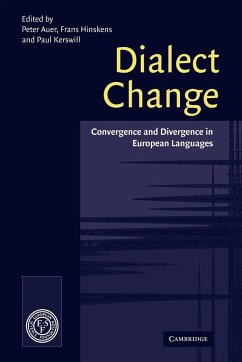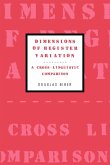Peter Auer / Frans Hinskens / Paul Kerswill (eds.)Convergence and Divergence in European Languages
Dialect Change
Convergence and Divergence in European Languages
Herausgeber: Auer, Peter L.; Kerswill, Paul; Hinskens, Frans
Peter Auer / Frans Hinskens / Paul Kerswill (eds.)Convergence and Divergence in European Languages
Dialect Change
Convergence and Divergence in European Languages
Herausgeber: Auer, Peter L.; Kerswill, Paul; Hinskens, Frans
- Broschiertes Buch
- Merkliste
- Auf die Merkliste
- Bewerten Bewerten
- Teilen
- Produkt teilen
- Produkterinnerung
- Produkterinnerung
This book brings together a team of leading scholars to explore all aspects of recent dialect change.
Andere Kunden interessierten sich auch für
![Language Loyalty, Continuity and Change Language Loyalty, Continuity and Change]() Ofelia GarcíaLanguage Loyalty, Continuity and Change39,99 €
Ofelia GarcíaLanguage Loyalty, Continuity and Change39,99 €![Language and Ethnicity Language and Ethnicity]() Carmen FoughtLanguage and Ethnicity61,99 €
Carmen FoughtLanguage and Ethnicity61,99 €![Literacy and Literacies Literacy and Literacies]() James CollinsLiteracy and Literacies42,99 €
James CollinsLiteracy and Literacies42,99 €![Language and Subjectivity Language and Subjectivity]() Tim McnamaraLanguage and Subjectivity77,99 €
Tim McnamaraLanguage and Subjectivity77,99 €![Dimensions of Register Variation Dimensions of Register Variation]() Douglas BiberDimensions of Register Variation58,99 €
Douglas BiberDimensions of Register Variation58,99 €![Multilingualism Multilingualism]() Anat StavansMultilingualism95,99 €
Anat StavansMultilingualism95,99 €![First Language Acquisition First Language Acquisition]() Eve V. ClarkFirst Language Acquisition117,99 €
Eve V. ClarkFirst Language Acquisition117,99 €-
-
-
This book brings together a team of leading scholars to explore all aspects of recent dialect change.
Hinweis: Dieser Artikel kann nur an eine deutsche Lieferadresse ausgeliefert werden.
Hinweis: Dieser Artikel kann nur an eine deutsche Lieferadresse ausgeliefert werden.
Produktdetails
- Produktdetails
- Verlag: Cambridge University Press
- Seitenzahl: 432
- Erscheinungstermin: 31. Juli 2008
- Englisch
- Abmessung: 229mm x 152mm x 25mm
- Gewicht: 697g
- ISBN-13: 9780521070669
- ISBN-10: 052107066X
- Artikelnr.: 23887492
- Herstellerkennzeichnung
- Libri GmbH
- Europaallee 1
- 36244 Bad Hersfeld
- gpsr@libri.de
- Verlag: Cambridge University Press
- Seitenzahl: 432
- Erscheinungstermin: 31. Juli 2008
- Englisch
- Abmessung: 229mm x 152mm x 25mm
- Gewicht: 697g
- ISBN-13: 9780521070669
- ISBN-10: 052107066X
- Artikelnr.: 23887492
- Herstellerkennzeichnung
- Libri GmbH
- Europaallee 1
- 36244 Bad Hersfeld
- gpsr@libri.de
Peter Auer is Chair of German Linguistics at the University of Freiburg
Frans Hinskens is Head of the Department of Linguistics at Meertens Instituut, Amsterdam, and Professor of Language Variation and Change at Free University, Amsterdam
Paul Kerswill is Senior Lecturer in Linguistics at the University of Reading
Frans Hinskens is Head of the Department of Linguistics at Meertens Instituut, Amsterdam, and Professor of Language Variation and Change at Free University, Amsterdam
Paul Kerswill is Senior Lecturer in Linguistics at the University of Reading
List of maps; List of figures; List of contributors; Preface; Map; 1. The
study of dialect convergence and divergence: conceptual and methodological
considerations F. Hinskens, P. Auer and P. Kerswill; Part I. Convergence,
Divergence and Linguistic Structure: 2. Internal and external factors in
phonological convergence: the case of English /t/ lenition J. Kallen; 3.
Dialect/standard convergence, mixing and models of language contact: the
case of Italy G. Berruto; 4. Convergence and divergence in grammar L.
Cornips and K. Corrigan; 5. Phonology, grammar and discourse in dialect
convergence J. Cheshire, P. Kerswill and A. Williams; Part II.
Macrosociolinguistic Motivations of Convergence and Divergence: 6.
Processes of standardisation in Scandinavia I. L. Pedersen; 7. The birth of
new dialects P. Kerswill and P. Trudgill; 8. Dialect convergence in the
German language islands P. Rosenberg; 9. Political borders and dialect
divergence/convergence in Europe C. Woolhiser; 10. The influence of urban
centres on the spatial diffusion of dialect phenomena J. Taeldeman; Part
III. Microsociolinguistic Motivations: 11. Subjective factors in dialect
convergence and divergence T. Kristiansen and J. Jørgensen; 12. How similar
are people who speak alike? An interpretive way of using social networks in
social dialectology research J. A. Villena-Ponsoda; 13. The role of
interpersonal accommodation in a theory of language change P. Auer and F.
Hinskens; References; Index.
study of dialect convergence and divergence: conceptual and methodological
considerations F. Hinskens, P. Auer and P. Kerswill; Part I. Convergence,
Divergence and Linguistic Structure: 2. Internal and external factors in
phonological convergence: the case of English /t/ lenition J. Kallen; 3.
Dialect/standard convergence, mixing and models of language contact: the
case of Italy G. Berruto; 4. Convergence and divergence in grammar L.
Cornips and K. Corrigan; 5. Phonology, grammar and discourse in dialect
convergence J. Cheshire, P. Kerswill and A. Williams; Part II.
Macrosociolinguistic Motivations of Convergence and Divergence: 6.
Processes of standardisation in Scandinavia I. L. Pedersen; 7. The birth of
new dialects P. Kerswill and P. Trudgill; 8. Dialect convergence in the
German language islands P. Rosenberg; 9. Political borders and dialect
divergence/convergence in Europe C. Woolhiser; 10. The influence of urban
centres on the spatial diffusion of dialect phenomena J. Taeldeman; Part
III. Microsociolinguistic Motivations: 11. Subjective factors in dialect
convergence and divergence T. Kristiansen and J. Jørgensen; 12. How similar
are people who speak alike? An interpretive way of using social networks in
social dialectology research J. A. Villena-Ponsoda; 13. The role of
interpersonal accommodation in a theory of language change P. Auer and F.
Hinskens; References; Index.
List of maps; List of figures; List of contributors; Preface; Map; 1. The study of dialect convergence and divergence: conceptual and methodological considerations F. Hinskens, P. Auer and P. Kerswill; Part I. Convergence, Divergence and Linguistic Structure: 2. Internal and external factors in phonological convergence: the case of English /t/ lenition J. Kallen; 3. Dialect/standard convergence, mixing and models of language contact: the case of Italy G. Berruto; 4. Convergence and divergence in grammar L. Cornips and K. Corrigan; 5. Phonology, grammar and discourse in dialect convergence J. Cheshire, P. Kerswill and A. Williams; Part II. Macrosociolinguistic Motivations of Convergence and Divergence: 6. Processes of standardisation in Scandinavia I. L. Pedersen; 7. The birth of new dialects P. Kerswill and P. Trudgill; 8. Dialect convergence in the German language islands P. Rosenberg; 9. Political borders and dialect divergence/convergence in Europe C. Woolhiser; 10. The influence of urban centres on the spatial diffusion of dialect phenomena J. Taeldeman; Part III. Microsociolinguistic Motivations: 11. Subjective factors in dialect convergence and divergence T. Kristiansen and J. Jørgensen; 12. How similar are people who speak alike? An interpretive way of using social networks in social dialectology research J. A. Villena-Ponsoda; 13. The role of interpersonal accommodation in a theory of language change P. Auer and F. Hinskens; References; Index.
List of maps; List of figures; List of contributors; Preface; Map; 1. The
study of dialect convergence and divergence: conceptual and methodological
considerations F. Hinskens, P. Auer and P. Kerswill; Part I. Convergence,
Divergence and Linguistic Structure: 2. Internal and external factors in
phonological convergence: the case of English /t/ lenition J. Kallen; 3.
Dialect/standard convergence, mixing and models of language contact: the
case of Italy G. Berruto; 4. Convergence and divergence in grammar L.
Cornips and K. Corrigan; 5. Phonology, grammar and discourse in dialect
convergence J. Cheshire, P. Kerswill and A. Williams; Part II.
Macrosociolinguistic Motivations of Convergence and Divergence: 6.
Processes of standardisation in Scandinavia I. L. Pedersen; 7. The birth of
new dialects P. Kerswill and P. Trudgill; 8. Dialect convergence in the
German language islands P. Rosenberg; 9. Political borders and dialect
divergence/convergence in Europe C. Woolhiser; 10. The influence of urban
centres on the spatial diffusion of dialect phenomena J. Taeldeman; Part
III. Microsociolinguistic Motivations: 11. Subjective factors in dialect
convergence and divergence T. Kristiansen and J. Jørgensen; 12. How similar
are people who speak alike? An interpretive way of using social networks in
social dialectology research J. A. Villena-Ponsoda; 13. The role of
interpersonal accommodation in a theory of language change P. Auer and F.
Hinskens; References; Index.
study of dialect convergence and divergence: conceptual and methodological
considerations F. Hinskens, P. Auer and P. Kerswill; Part I. Convergence,
Divergence and Linguistic Structure: 2. Internal and external factors in
phonological convergence: the case of English /t/ lenition J. Kallen; 3.
Dialect/standard convergence, mixing and models of language contact: the
case of Italy G. Berruto; 4. Convergence and divergence in grammar L.
Cornips and K. Corrigan; 5. Phonology, grammar and discourse in dialect
convergence J. Cheshire, P. Kerswill and A. Williams; Part II.
Macrosociolinguistic Motivations of Convergence and Divergence: 6.
Processes of standardisation in Scandinavia I. L. Pedersen; 7. The birth of
new dialects P. Kerswill and P. Trudgill; 8. Dialect convergence in the
German language islands P. Rosenberg; 9. Political borders and dialect
divergence/convergence in Europe C. Woolhiser; 10. The influence of urban
centres on the spatial diffusion of dialect phenomena J. Taeldeman; Part
III. Microsociolinguistic Motivations: 11. Subjective factors in dialect
convergence and divergence T. Kristiansen and J. Jørgensen; 12. How similar
are people who speak alike? An interpretive way of using social networks in
social dialectology research J. A. Villena-Ponsoda; 13. The role of
interpersonal accommodation in a theory of language change P. Auer and F.
Hinskens; References; Index.
List of maps; List of figures; List of contributors; Preface; Map; 1. The study of dialect convergence and divergence: conceptual and methodological considerations F. Hinskens, P. Auer and P. Kerswill; Part I. Convergence, Divergence and Linguistic Structure: 2. Internal and external factors in phonological convergence: the case of English /t/ lenition J. Kallen; 3. Dialect/standard convergence, mixing and models of language contact: the case of Italy G. Berruto; 4. Convergence and divergence in grammar L. Cornips and K. Corrigan; 5. Phonology, grammar and discourse in dialect convergence J. Cheshire, P. Kerswill and A. Williams; Part II. Macrosociolinguistic Motivations of Convergence and Divergence: 6. Processes of standardisation in Scandinavia I. L. Pedersen; 7. The birth of new dialects P. Kerswill and P. Trudgill; 8. Dialect convergence in the German language islands P. Rosenberg; 9. Political borders and dialect divergence/convergence in Europe C. Woolhiser; 10. The influence of urban centres on the spatial diffusion of dialect phenomena J. Taeldeman; Part III. Microsociolinguistic Motivations: 11. Subjective factors in dialect convergence and divergence T. Kristiansen and J. Jørgensen; 12. How similar are people who speak alike? An interpretive way of using social networks in social dialectology research J. A. Villena-Ponsoda; 13. The role of interpersonal accommodation in a theory of language change P. Auer and F. Hinskens; References; Index.
'... an excellent book based on internationally oriented research that sets the topic of dialect convergence and divergence into the broader context of dialect and language dynamics. It offers many insights for the interested non-specialist as well as the critical specialist looking for new and yet unsolved research questions.' Sociolinguistica








